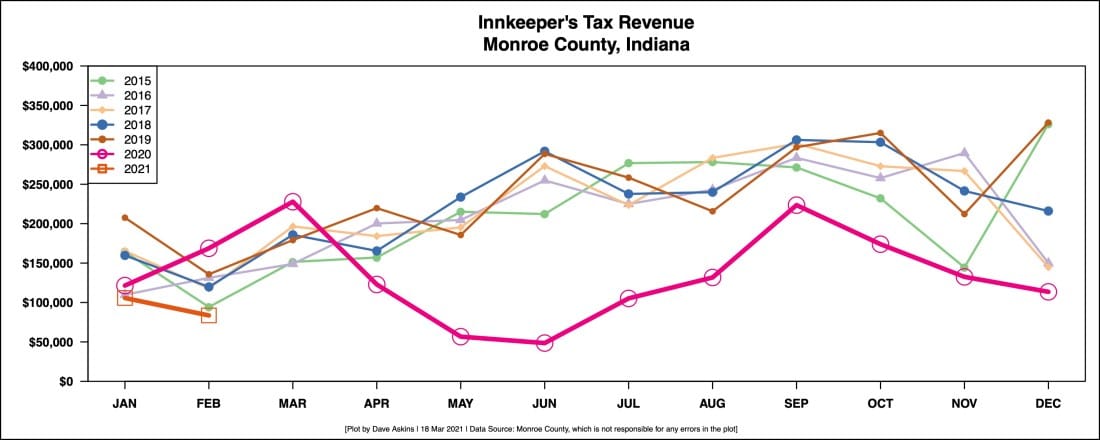Convention and visitors group eyes 2021 recovery, helped by food and beverage money


On Thursday, convention and visitors commissioner Mike Campbell delivered to his colleagues an update on Monroe County’s innkeeper’s tax revenues. The news was not as bad as over the summer.
Another bright spot on Thursday for the five-member convention and visitors commission (CVC) related to a different revenue source—the countywide food and beverage tax. The CVC approved a quarterly debt payment of $159,000 from a fund that holds food and beverage money.
It was a bright spot, because historically it has been the innkeeper’s tax that has paid for debt service. The use of the food and beverage money needed approval from the food and beverage tax advisory commission (FABTAC).
The FABTAC recommended that up to $300,000 of the county’s share of food and beverage tax revenues could be used to service the debt from past renovations and land acquisition for the convention center.
Monthly revenues from innkeeper’s tax, a 5-percent charge on lodging in the county, hit their COVID-19 pandemic low point in June. That’s when the $48,541 collected in 2020 was just 16.8 percent of the $288,525 that was collected in June 2019.
The $189,306 that has been collected through the first two months of 2021, is 65.2 percent of the $290,290 in innkeeper’s tax revenue that was collected in January and February last year, Campbell reported.
About the potential positive signs of recovery in those figures, Campbell said, “There seems to be at least some solace in that it’s not where we were in the summertime.”
Pre-pandemic innkeeper’s tax revenues last year were stronger than they’ve been in the last six years. But for all of 2020, the $1,626,851 collected was just 57.2 percent of the $2,842,936 that was collected in 2019.
Less severely impacted has been the other tax that is connected to the convention center: the countywide 1-percent tax on prepared food and beverages. The food and beverage tax was enacted to support the convention center expansion. The expansion project has not moved forward during the pandemic, after stalling for several months ahead of the March 2020 shutdown.
For the food and beverage tax, the combined city and county total of $2,792,664 collected in 2020 was 81 percent of the $3,447,210 that was collected in 2019.
The better innkeeper’s tax numbers since the summer are discernible in week-to-week numbers of room rentals. Mike McAfee, executive director of Visit Bloomington, told the CVC that last week 7,576 rooms were sold, which was an increase of about 681 rooms over the previous week. “We are seeing slight growth like that. We do hope to continue to see that,” McAfee said.
Visit Bloomington is staffing back up to prepare for recovery. McAfee told the CVC a new content coordinator had been hired starting March 8. Four interviews are scheduled next week for a graphic designer, he added.
The status of the convention sales position is still being evaluated McAfee said. “We want to make sure we time that correctly, when it’s time to promote again.”
McAfee also reported that the visitor’s center, on Walnut Street north of SR-45/46, had been reopened to the public starting March 1. “We’ve had tons of people coming in the last few days picking up March Madness] masks,” he said.
March Madness is the branding for the NCAA college basketball tournament. This year, several of the games are being played at Indiana University’s Assembly Hall in Bloomington.
A somewhat lower-profile basketball tournament will arrive in the area at the end of March. According to McAfee, on the last weekend of March, the Great Lakes State Basketball Championships, for players in third through eighth grade, will be hosted in the area.
The games will probably be played in Spencer, in neighboring Owen County. That’s because more people will be allowed in the gyms there, compared to what would be allowed under the gathering restrictions that are in place for Monroe County, McAfee said.
But the teams will be overnighting in Monroe County. Over 90 teams are registered, which means Monroe County has 509 room nights on the books, McAfee said. About the COVID-19 restrictions, McAfee said, “I can’t tell you how much we’re stressing with the client, how important it is that it’s a safe event.”
McAfee said at Thursday’s meeting that Monroe County’s hotel market has about 1,800 rooms. That means if 150 rooms are booked, that’s about a 10-percent occupancy increase, which makes it significant, but not an unsafe impact on the community. “We’re not talking about thousands of people and unsafe numbers,” he said.




Comments ()